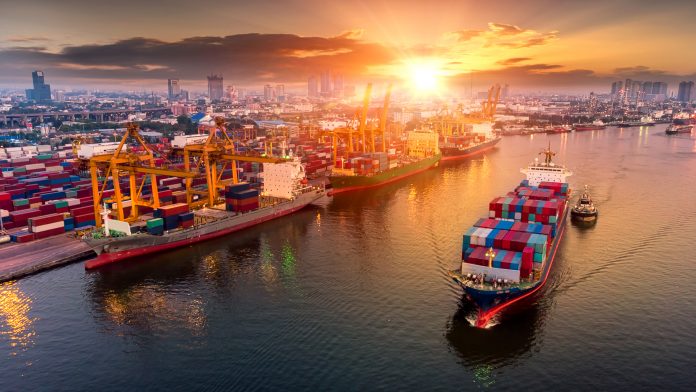A UK company is utilising satellite data to create technology that will enable the shipping industry to lower its CO2 emissions and facilitate wind power for use on ships.
Currently, around 90% of the goods we consume are moved via the sea, and as world trade increases, there is an ever-growing number of ships crossing the oceans, each burning through large quantities of energy. In fact, it is estimated that the shipping industry is accountable for an annual 940 million tonnes of CO2, which equates to 2.5% of the world’s total.
As a result, the International Maritime Organization has set a bold target for it to reduce these emissions by 50% by 2050, and the UK Government is leading this initiative by being the first in the world to include emissions from international shipping in its domestic carbon budget.
Wind-assist power solution
In order to assist the UK shipping industry in meeting this challenge, Smart Green Shipping, a UK company, has established a wind-assist power solution modelled on America’s Cup wingsails. Its ‘FastRigs’ system encompasses a series of ‘smart’ vertical aerofoils mounted on vessels, which are paired with an advanced analysis system that can precisely measure the availability of wind to any ship, and across any trade route at varying speeds.
With this novel technology, researchers at Smart Green Shipping are hoping to reduce fuel consumption by a fifth initially, with plans to increase this amount as the technology improves.
Meteorological and satellite technology
At the European Space Agency’s Business Incubation Centre UK (ESA BIC UK), Smart Green Shipping has been utilising meteorological and satellite technology in order to build the prototype for this trailblazing digital software for the wingsail system. This digital software can deliver estimated annual fuel savings accrued, whether that is through retrofitting the technology into an existing ship or as part of a new-build design. This will support project partners in financing the greenhouse gas-saving saving technology.
The wingsails are also ‘intelligent’, with the ability to detect when to turn to make the most of the wind angle and speed, on top of retracting when approaching a bridge or when wind speeds present a danger. This unique technology is capable of carrying all of this out autonomously, meaning it is not necessary to have any additional crew to manage.
Funding for space and satellite technology start-ups
The ESA BIC UK is a component of the world’s biggest business incubation programme for start-ups employing space or satellite technologies to build new products and services. Managed and partly funded, by the Science and Technology Facilities Council (STFC), in partnership with ESA Space Solutions, the UK Space Agency and the University of Leicester, it aims to support small businesses that are developing groundbreaking products and services for a progressively competitive, global marketplace.
To date, it has incubated almost 100 start-up companies, and Smart Green Shipping is the most recent company to have graduated from the programme, having completed a two-year support programme.
Diane Gilpin, Founder and CEO of Smart Green Shipping, said: “Wind is free, clean and abundantly available to ships that are equipped to harness it. Our modern wind-assist solutions are highly advanced and optimised to enable the shipping industry to start driving down emissions immediately. For SGS, the ESA BIC UK support over the last two years has been of key strategic importance to our mission to drive the uptake of renewables in the maritime industry using wind power. The development of our digital tool is critical to our efforts to support ship owners assessing the commercial viability of installing wind-assist solutions on their ships.”
Dr Sue O’Hare, Operations Manager at the ESA BIC UK, said: “Combining satellite technology with wind power in a mission to reduce CO2 emissions in the global shipping industry is an inspirational example of how space can help address both our environmental and industrial challenges. I’m thrilled to have supported SGS in the development of such pioneering technology and wish it every success as it takes its business to the next level.”
The ESA BIC UK is a UK-wide programme, incorporating the Harwell Campus in Oxfordshire, Sci-Tech Daresbury in the North West, the Royal Observatory in Edinburgh and the new Space Park Leicester.
Part of the ESA Space Solutions network of successful ESA BICs across Europe, the ESA BIC UK delivers up to 15 start-ups every year with a mixture of funding and access to world-leading technical expertise, facilities and business development support.





